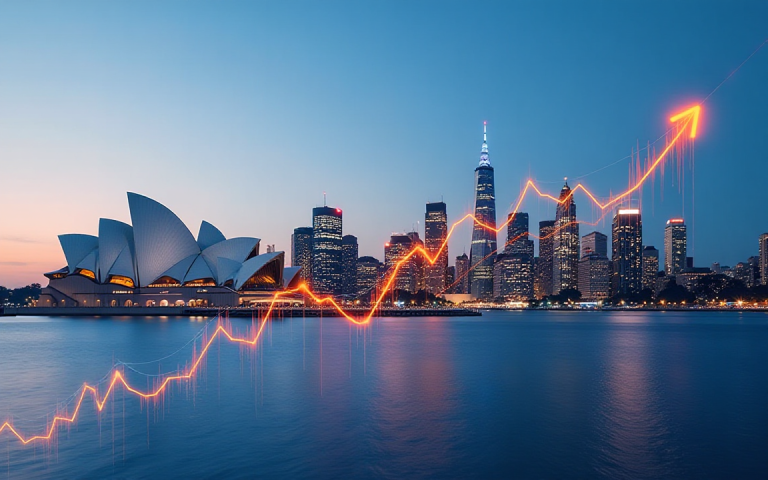Shares of Commonwealth Bank of Australia (CBA) surged to a record high on Tuesday, buoyed by news of a ceasefire between Iran and Israel announced by US President Donald Trump.
The announcement sparked renewed optimism in financial markets, with investors pivoting toward safer assets like Australian equities.
CBA’s share price rose as much as 2.3% to A$188.55 in early trading, propelling its market capitalization past the $200 billion mark for the first time, according to Bloomberg data.
The rally solidified CBA’s position among the ten largest global lenders, surpassing Royal Bank of Canada’s market value of $179 billion.
“The Australian market tends to be sensitive to geopolitical developments as heavyweight mining stocks are exposed to commodity prices, and the ceasefire announcement has been a catalyst for the strong recovery after a few disappointing sessions,” said Junvum Kim, senior sales trader at Saxo Asia Pacific.
However, despite the geopolitical tensions which have rattled global markets, CBA has continued to attract investors, largely due to Australia’s perceived economic stability and the bank’s dominant role in the domestic financial sector.
What is behind CBA stock’s appeal among investors?
As the largest constituent of Australia’s benchmark index, making up 12%, CBA has become a go-to stock for offshore investors seeking defensive exposure.
“The driving reason for this continued rally is that there are still offshore investors who want exposure to the Australian stock market,” said Tony Sycamore, a market analyst at IG Australia in Sydney in a Bloomberg report.
Investors looking to invest in the relative safety of the nation’s equities are heading toward CBA, he added.
Source: Bloomberg
The bank’s long-term performance backs up investor enthusiasm.
Over the past five years, CBA’s share price has climbed more than 170%.
This is despite its earnings per share growing at a modest 5.4% annually—suggesting that market sentiment has lifted valuations beyond what earnings alone would justify.
Valuation concerns linger despite momentum
However, some analysts remain cautious about the sustainability of CBA’s rally.
Commonwealth Bank is seen as having the least return potential among major global lenders.
It also ranks among the most expensive bank stocks, trading at 30 times forward earnings—double the valuation of JPMorgan Chase & Co., which trades at a multiple of 15.
“Commonwealth’s A$300 billion market capitalization is being driven more by the absence of better investment alternatives than by its intrinsic strengths,” Citi analyst Thomas Strong wrote in a note to clients.
He believes that investors have largely chased earnings momentum, joining a broader trend of rotating into bank stocks from other sectors.
He attributes much of the rally to passive investment flows creating a structural squeeze.
Strong warns that history suggests sector rotations—when investors shift funds between industries—can unfold rapidly, potentially putting pressure on the stock.
Outlook: what should you do with the stock?
According to the Wall Street Journal, 10 of 15 analysts covering the stock recommend selling it, with four underweight on the stock, with an average price target of $117.15, an almost 38% downside.
Macquarie, for instance, is bearish, while Citi and UBS warn of stretched valuations and limited core profit growth.
As conviction builds around alternative investment opportunities, Thomas expects this to serve as the trigger that ends Commonwealth Bank’s stretch of share-price outperformance.
He expects that growing conviction in alternative investment ideas could serve as the trigger for a broader correction in CBA’s stock price.
“Short-term momentum is self-fulfilling. The stock’s rise has attracted algorithmic traders and retail investors chasing returns, creating a feedback loop. As shows, the disconnect between its soaring share price and stagnant earnings is stark,” said AInvest.
“The CBA rally is a short-term liquidity-driven phenomenon, not a reflection of durable value. While the stock may continue to climb in the near term, the risks of a sharp correction are high,” the platform says, urging investors to “avoid chasing” the momentum.
“Even if geopolitical distractions keep investors complacent, the fundamentals and broker warnings suggest a peak is near,” it says.
The platform advises investors to wait for a pullback and look for dips below $150 before considering entry, ideally paired with clearer macro stability or earnings upgrades.
The post CBA stock hits record, tops $200B after ceasefire, but overvaluation risks remain appeared first on Invezz

